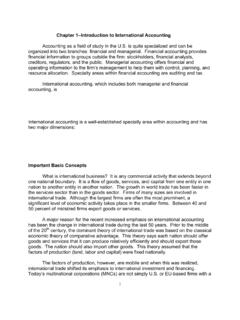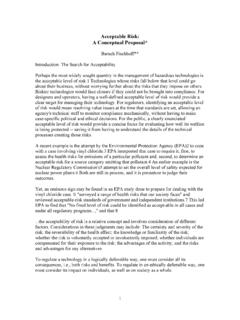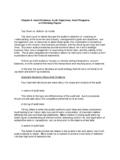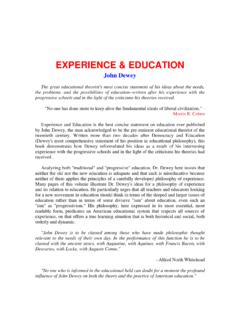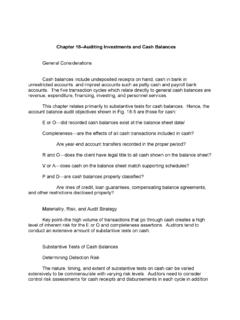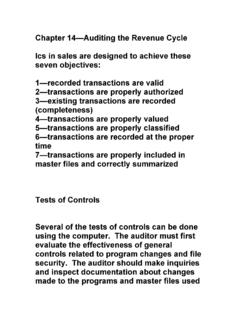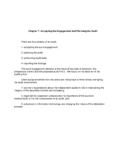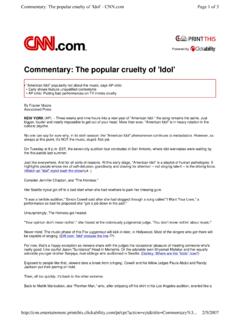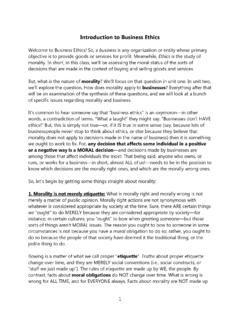Transcription of Chapter 1—Introduction to International Accounting
1 Chapter 1 introduction to International Accounting International Accounting , which includes both managerial and financial Accounting , is Accounting for International transactions, the operations of International firms, and comparisons of Accounting principles and practices found in foreign lands and the procedures by which they are established. International Accounting is a well-established specialty area within Accounting and has two major dimensions: 1. comparative examining how and why Accounting principles differ from country to country 2. pragmatic Accounting for the operational problems and issues encountered by individuals and firms in International business The most important International Accounting topics are classified as follows: Financial acctg Managerial acc Foreign currency Foreign exch.
2 Translation risk mgt. Consolidation foreign invest. Analysis Segment reporting information Systems Inflation acctg. Transfer Pricing Disclosure budgeting Auditing performance Evaluation Taxation control Comparative accg. Operational Auditing The Multinational Corporation The different attitudes of management toward International operations can be organized into three categories: 1 ethnocentric emphasis on own nation home-country oriented 2 polycentric accepts other nations host-country oriented 3 geocentric truly International in scope Firms typically evolve into MNCs, and this process is shown below: Step 1 strictly domestic with no International business Step 2 casual International business .
3 It is passive, unsolicited, unexpected, but not unwelcome Step 3 initial International business . The business is active, solicited, and expected. However, it is initially on a very limited scale. Step 4 essentially International in scope. Internationalized management but the domestic side is still larger. Step 5 multinational operations. International is a co-equal with domestic business , the firm deals in global markets for products and input factors, the firm is not tied to one nation, and the firm s capital needs are met in world markets. Does multinationality (the percentage of a firm s sales represented by foreign sales) increase firm value? Foreign Direct Investment Below is a summary of the theories that explain foreign direct investment: 1.
4 International trade theory a. comparative cost view b. product life cycle view 2. location theory 3. investment theory a. imperfect capital markets view b. portfolio-of-FDI view 4. theory of the firm 5. industrial organization theory Global Capital Markets The benefits of listing on a foreign stock market include: 1. financial benefits associated with a reduced cost of capital 2. marketing and public relations benefits 3. political benefits 4. employee relations benefits The costs of foreign listing are generated by the costs of increased Accounting and disclosure requirements. They include: 1. adjustments of Accounting procedures 2. adjustment of auditing procedures 3. changes in the frequency of reporting 4. costs resulting from more extensive foreign financial disclosures than are required for domestic competitors 5.
5 Monetary expense, time, and administrative effort in initial registration 6. recurring costs of compliance 7. simultaneous offering at home and abroad could be affected by foreign regulation 8. foreign regulatory agency s jurisdiction over global business practices Accounting Standards for the MNC The second question what should be required by the standards is somewhat difficult to answer given the lack of knowledge of the decision requirements of user groups. Examples of various issues include: --defining user information needs --the role of general purpose vs. special purpose reports --segmental information by activity and country --transfer pricing and its impact --foreign currency transactions and currency translation -- Accounting for groups and consolidation of financial statements -- Accounting for taxation -- Accounting for inflation --foreign exchange risk management --investment planning The third question who should set the standards is the most difficult and sensitive one.
6 The MNC itself could set the standards. Two alternatives political or professional entities. The latter is preferable but the political may have merit. The Need for International Accounting To meet the requirements of a multiple audience of interests from different countries, three identifiable approaches have been advocated: 1. primary and secondary financial statements Secondary financial statements will have one or more of the following characteristics: --the reporting standards of a foreign country will have been followed --the statements will have been translated into a language that is not the language of the company s country of domicile --the auditor s report will have been expressed in a form not commonly used ion the company s country of domicile 2.
7 Single domicile reporting Mueller gives the following explanation: The notion of a single domicile for financial statements means that each set of financial statements necessarily has a nationality, reflects style and customs at a particular viewpoint or characteristic. Financial statements are anchored in a single set of underlying account data prepared within a framework of quite specific Accounting standards, methods and procedures. Restatement of financial statements to a different set of Accounting principles produces different relationships between individual account balances and financial ratios. 3. International reporting standards This school of thought argues that internationally accepted Accounting standards should be adopted by all nations in the preparation of their financial statements.
8 The Internationalization of the Accounting Profession The following reasons have been proposed for this phenomenon: 1. common bases of reporting the foreign subsidiary is concerned not only with meeting the Accounting requirements of the host nation but also with showing consistent application of principles required by the parent. An International Accounting firm can achieve both objectives. 2. common auditing standards the parent firm would prefer to have its own International operations examined by firms applying similar standards and methods of auditing and to be judged by professionals applying common criteria and demands for accuracy. 3. reliance on the work of other auditors because of the future of achieving common standards of reporting and auditing, the auditors of parent firms must be careful about their reliance on the work of a foreign auditor, especially when they have to assume responsibility for all subsidiaries included in the consolidation.
9 Accounting and Economic Development Accounting may hold certain roles in economic development: 1. the skills and techniques which make up Accounting are essential to the development of commerce, industry, and public administration 2. Accounting helps in the evaluation of successful industrialization and mobilization of capital 3. Accounting is essential to efficient functioning of capital markets through the production of reliable and timely information 4. helps provide governments with data for implementing public policy, controlling and regulating private enterprise, controlling economic cycles, measuring national income, and collecting taxes 5. assists management in making decisions, control of subsidiaries, budgeting and forecasting
